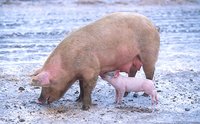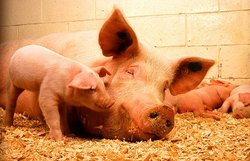Pig
|
|
- For other uses, see Pig (disambiguation).
- Shoat redirects here; for the sheep/goat hybrid, see geep.
| Domesticated Pig | ||||||||||||||
|---|---|---|---|---|---|---|---|---|---|---|---|---|---|---|
 Sow with piglet | ||||||||||||||
| Scientific classification | ||||||||||||||
| ||||||||||||||
| Binomial name | ||||||||||||||
| Sus scrofa Linnaeus, 1758 Template:Taxobox begin synonyms Template:Taxobox synonym entry simple Template:Taxobox end synonyms |
The domestic pig is usually given the scientific name Sus scrofa, though some authors call it S. domesticus, reserving S. scrofa for the wild boar. It has been a domesticated animal for approximately 5,000 to 7,000 years. The animal is found across Europe, the Middle East and extends into Asia as far as Indonesia and Japan. The distinction between wild and domestic animals is slight, and domestic pigs have become feral in many parts of the world (for example, New Zealand). Feral pigs can cause substantial environmental damage. The family Suidae also includes about 12 separate species of wild pig, most also classified in the genus Sus.
Pigs are one of the most intelligent animals, and some are kept as pets. Pigs are reportedly more intelligent and more trainable than dogs and cats. Pigs were brought to southeastern North America from Europe by De Soto and other early Spanish explorers, where escapees became feral and became freely used by Native Americans as food.
Sus scrofa has four subspecies, each occupying distinct geographical areas. They are Sus scrofa scrofa (western Africa, Europe), Sus scrofa ussuricus (northern Asia and Japan), Sus scrofa cristatus (Asia Minor, India), and Sus scrofa vittatus (Indonesia).
Many different words in English identify different types of pigs:
- Adult male pigs are called "boars".
- Adult females are called "sows".
- Juvenile animals are called "piglets" and "farrows".
- Young pigs between 100–180 pounds (50 to 90 kg) are called "shoats".
- A "gilt" is an immature female pig.
- A "barrow" is a castrated male pig.
- "Hog" is used as a synonym of "pig" in the United States; in its original sense it means a castrated boar.
- "Swine" is a plural noun meaning pigs
Pigs (or swine) that are allowed to forage may be watched by swineherds. A litter of piglets typically contains between 10 and 12 animals. Meat from pigs is called pork (coming from the Latin words "porcinus" and "porcus"). Their trotters are often sold as the jelly-like dish of pig's feet. Hog jowls are a popular soul food. The American pig-raising industry calls pork a "white meat" (like poultry) implying it is healthier than "red meat" like beef. Both Islam and Orthodox Judaism forbid the eating of pork in any form, considering it to be an unclean animal: no form of pig meat can be kosher or halal (see taboo meat).
While pigs are raised mostly for meat, their skin is used as a source of leather. Their bristly hairs are also traditionally used for brushes.
Pigs are omnivores, making them easy to raise: on a small farm or in a large household they can be fed kitchen scraps as part or all of their diet. Occasionally, in captivity, they eat their own young.
Pigs lack sweat glands. Thus they must have access to water or mud to cool themselves during hot weather. Pigs have an excellent sense of smell, in many European countries they are used in the hunting of truffles as they are said to smell like the genitalia of a boar.
Miscellaneous
- In ancient Greece, a sow was an appropriate sacrifice to Demeter and had been her favorite animal since she had been the Great Goddess of archaic times. Initiates at the Eleusinian Mysteries began by sacrificing a pig.
- The pig is one of the 12-year cycle of animals which appear in the Chinese zodiac related to the Chinese calendar. Believers in Chinese astrology associate each animal with certain personality traits. See: Pig (Zodiac).
- Zhu Bajie is a famous part human, part pig, literary character from the Chinese novel Journey to the West.
- The English language abounds with unflattering references and idioms involving pigs. Pigs are commonly associated with greed ("as greedy as a pig"), obesity, gluttony ("to pig out") and sloth ("a lazy pig"). Likewise, a hog is someone or something that monopolizes time, resources, or processes, e.g. a road hog or server hog. Pigs are also associated with dirtiness ("this room is a pigsty"); the latter probably comes from their habit of wallowing in mud. The perenially soot-covered character in the Peanuts comic strip is named Pig-Pen.
- "Pig" is also used as a derogatory slang term for a police officer in more than just the English language.
- Pig iron is so named because the smolten iron ore was once poured into molds resembling rows of suckling pigs.
- American footballs were originally made from pig skin.
- The familiar piggybank got its name and shape as a result of a pun on the word pygg, a type of clay commonly used to produce household items in the 18th Century.
- Pigs can become sunburned.
See also
- Ham
- Guinea pig (not related to the pig)
- Hog lot
- List of fictional pigs
- Pig iron
- Pigpen
- Pig War
- Fetal pig
- Hogzillaast:Gochu
ca:Porc cy:Mochyn de:Hausschwein es:Cerdo eo:Porko fr:Porc gd:Muc ja:ブタ ka:ღორი nl:Varken nds:Swien oc:Pòrc pl:Świnia pt:Porco fi:Sika sv:svin zh:猪 no:Gris

